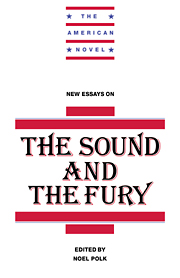Book contents
- Frontmatter
- Contents
- Series Editor's Preface
- 1 Introduction
- 2 Faulkner's Text Which Is Not One
- 3 “Now I Can Write”: Faulkner's Novel of Invention
- 4 Quentin Compson: Tyrrhenian Vase or Crucible of Race?
- 5 Trying Not to Say: A Primer on the Language of The Sound and the Fury
- Notes on Contributors
- Selected Bibliography
3 - “Now I Can Write”: Faulkner's Novel of Invention
Published online by Cambridge University Press: 23 December 2009
- Frontmatter
- Contents
- Series Editor's Preface
- 1 Introduction
- 2 Faulkner's Text Which Is Not One
- 3 “Now I Can Write”: Faulkner's Novel of Invention
- 4 Quentin Compson: Tyrrhenian Vase or Crucible of Race?
- 5 Trying Not to Say: A Primer on the Language of The Sound and the Fury
- Notes on Contributors
- Selected Bibliography
Summary
THE NATURE of the superior text is to resist its readings: to complicate, at some crucial turn in the interpretive process, the categories and conventions that have formed a reader's bridge into that text, without which the act of interpretation cannot begin. Although selected in part on the basis of the cursory views that tell us quickly the outlines and major conflicts of a text, essentially these conventions constitute what we are and know prior to reading. They may be public or private, the shared literary and sociopolitical history of a community of readers, or the more personal history of a particular reader. They may steer a reading to an apparent center of the text or toward its margins, may refer to a largely concealed system of meaning governing the text and our responses to it – what some call its “ideology” – or discover a subversive system that clashes with that meaning.
These approaches may claim or unconsciously imply either their power or their powerlessness, a position authorized by the prevailing value system or victimized by it, but they are all strategies of reading. Their object is the traditional one of familiarizing the text, even if that process of familiarization discloses a structure of oppression. The strategies prepare a system of signs, a critical language, through which the text assumes meaning. This meaning, however, has been largely predetermined by the strategies. Reading thus necessarily projects a text known primarily through what is already known, preventing it from expanding beyond the boundaries of the approach adopted at the outset. Reading produces no new knowledge but only confirmation and extension of its own origins.
- Type
- Chapter
- Information
- New Essays on The Sound and the Fury , pp. 71 - 98Publisher: Cambridge University PressPrint publication year: 1993



